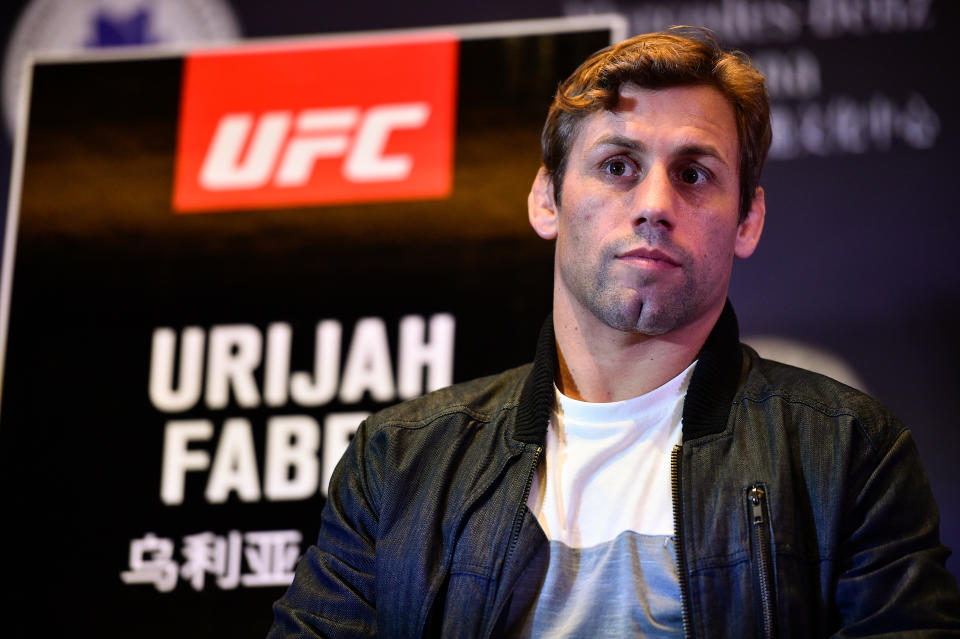'Now's the time': Why UFC Hall of Famer Urijah Faber is coming out of retirement

Urijah Faber (34-10) will officially end what has been a 31-month retirement on Saturday when he takes on rising bantamweight prospect Ricky Simón (15-1) at the Golden 1 Center in Sacramento, California (8 p.m. ET, ESPN+).
It has been a retirement in name only, however.
Faber has continued to participate in the UFC’s anti-doping protocol. He has dutifully hit the gym and trained like he was an active fighter. He’s watched his weight and been careful about what he eats. He even fielded regular calls from UFC matchmaker Sean Shelby offering fights.
“I still had fights on my contract and he’d call and offer me fights and he’d say, ‘Just because you say you’re retired doesn’t mean I’m going to stop calling and offering you fights,’ ” Faber said Shelby told him.
The only thing Faber didn’t do that his teammates at the Sacramento-based Team Alpha Male did do was say yes.
He hasn’t fought since announcing that his Dec. 17, 2016, bout in Sacramento against Brad Pickett would be his last.
He was elected to the UFC Hall of Fame the next year, a sure sign of retirement even if he never filed formal papers notifying the UFC of his intent to walk away.
He threw himself into his mini-business empire, the list of which includes his gym and enough others to be about as long as his right arm. He became a father for the first time — his daughter is Cali, somehow appropriate for her California-native father who walks to the cage to the strains of “California Love,” and whose nickname is “The California Kid” — and had time to observe his teammates.
What did he learn by taking a 10,000-foot view at the sport he excelled at for so long?
“You learn a lot about the fight game when you step away from it for a bit,” he said. “I think I understand better now why I had success and why other people might struggle. I got myself motivated by watching people who weren’t doing the right thing. It was like, ‘Hey man, don’t you understand what you’re potentially costing yourself?’ But I’d also get motivated by seeing people who were really going for it and pushing and were doing that right thing. To see an elite athlete give everything toward trying to achieve a goal, that gets you motivated, too.
“I realized it’s not my age that made me a top fighter from the beginning to the end of my career. It’s the consistency and the mindset and some natural gifts and just believing in yourself. I had a milestone birthday (turning 40 on May 14) and I had always said I might just jump back in when I hit a milestone and try it again as kind of a life hack. And then this card in Sacramento popped up and I was like, ‘You know what? Now’s the time. Let’s do it.’ ”
Fighters retire and then un-retire all the time. But it’s a very low percentage who have sustained success once they come out of retirement.
In most cases, they’ve retired because the lifestyle of a fighter is difficult, and they get tired of having aches and pains all the time. But when they return, they’re usually only shells of themselves.
Faber cracks that famous dimpled smile of his at the question. He wasn’t beaten up and he was still competing at a high level.
“I’m pretty sure I’m not on too many guys’ highlight reels,” he said, laughing.
But because he coaches so much, he gets to compare himself to his athletes. He said that provides a sense of where he stands. He’s long been one of the brightest athletes in the sport, and said he’ll know before anyone when he is no longer capable of competing.
He’s not fighting because he needs the money or because he missed the spotlight. He loves it deeply and that urge to compete never left him.
“I understand there are no guarantees in the fight game,” he said. “And I’m a pretty realistic guy and if I see I’m not able to measure up in the gym where I’m training with the best guys in the world, I’ll know. And look, my style has never been one where I accumulate a lot of damage.
“As long as I feel I want to do it and I’m doing it for myself, then I feel good about it. If it becomes something where I’m getting injured or hurt, then I just won’t do it. Some people have said to me, ‘Oh, you exited at the perfect time.’ I didn’t exit at the perfect time. I exited because I wanted to.”
He’s back because that fire began burning yet again, and just training for grappling competitions wasn’t cutting it.
“I’m fighting for what I think are the right reasons,” he said. “I’m doing it because I want to. It’s something for me. I don’t need the money and I don’t have to try to impress anyone. I want to do this and so I’m doing it. And when I don’t feel like I can do it anymore, I’ll say that’s it and go on to something else. It’s pretty simple.”
More from Yahoo Sports:


